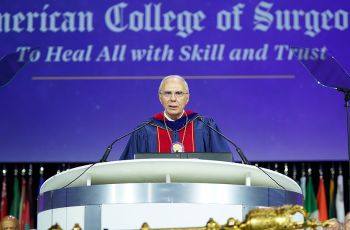From playing golf or tennis to poor posture while working, shoulder or elbow pain are common musculoskeletal conditions. What at first, may seem like a simple sprain, could be a more serious injury. Zachary Zimmer, MD, an orthopaedic surgeon at The GW Medical Faculty Associates who specializes in shoulder and elbow surgery, sees these injuries on a daily basis.
Dr. Zimmer, who is also an assistant professor of orthopaedic surgery at the George Washington University School of Medicine and Health Sciences, gives insight into his practice and how he treats shoulder and elbow injuries.
Q: Why did you choose orthopedic surgery as a specialty? Why did you decide to focus on shoulder and elbow surgery?
Dr. Zimmer: I became interested in orthopaedic surgery after spending a few summers shadowing my mentor, who is a sports medicine surgeon in New York. I was drawn to the idea that most patients often had a condition that could be treated, either with or without surgery, and then return to their normal daily activities or return to playing the sports they enjoy. Unlike a lot of conditions in medicine where things are “managed,” such as diabetes or hypertension, many orthopaedic injuries can often be definitively treated, such as a fracture or hip arthritis. I felt I could make a real difference in the lives of my patients by getting them back to their normal lives.
Q: What are some common shoulder and elbow injuries that you see in your practice?

Dr. Zimmer: The most common shoulder injuries I see are rotator cuff disorders (tendinitis or tears), biceps tendinitis, labral tears, shoulder instability, shoulder arthritis, or fractures about the shoulder. For elbow injuries, I often see patients with elbow tendinitis (ie, “tennis elbow" or “golfer’s elbow”), nerve entrapment, elbow instability, and elbow fractures.
Q: If someone hurts their shoulder or elbow, what are the “tell-tell” signs that they should seek medical care?
Dr. Zimmer: Oftentimes, shoulder and elbow pain can develop and worsen over time. People think that the pain will improve and sometimes it does. However, when the pain does not seem to improve over a period of time, patients should seek care. Patients also should see a doctor if they notice a loss of function in their shoulder or elbow, such as difficulty raising their hand over their head or bending or extending their elbow. Traumatic injuries tend to bring patients in sooner, especially if there is severe pain, a deformity and/or bruising, or sudden loss of function of the shoulder or elbow. These are some signs that a patient should be seen more urgently.
For more severe injuries that a patient thinks should warrant a trip to the doctor, icing the shoulder or elbow can help reduce any associated swelling and pain associated with the injury. Anti-inflammatories can also be helpful for pain. If it hurts to move the joint, wearing a sling can also provide some relief.
Q: Tell me about minimally invasive surgery options. What patients are typically a candidate?
Dr. Zimmer: Many of the procedures I do on the shoulder are arthroscopic, which is a minimally invasive technique where a camera is used to see the shoulder joint and surrounding structures to perform specific procedures. These include rotator cuff repairs, treatment of labral injuries and/or shoulder instability, and treatment of biceps tendinitis. Most patients with these types of conditions are candidates for the arthroscopic technique.




